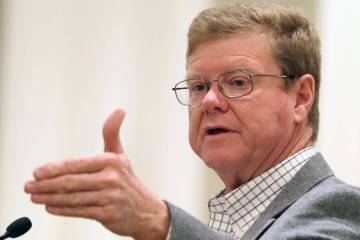State budget lies at heart of session agenda
Carson City -- The 76th regular session of the Nevada Legislature convenes Monday for a scheduled 120 days. Here are some of the key issues that legislators are facing:
STATE BUDGET
Republican Gov. Brian Sandoval handed legislators a two-year budget that proposes state spending of $5.8 billion, a 6.4 percent -- or $402 million -- reduction from current spending.
Sandoval proposes no tax increases. He wants to end furloughs but require state employees, as well as teachers and professors, to accept 5 percent pay cuts. He also would lay off 361 employees.
He wants to require counties to pay for $80 million in services delivered by the state, while taking $121 million in county property taxes to pay for higher education and $425 million in school bond reserves to cover shortfalls in public education.
From the moment Sandoval released his budget on Jan. 24, Democrats have contended his figures underestimate cuts state agencies really would face.
They believe Sandoval should compare his spending plan with the budget the Legislature approved in June 2009. But they themselves voted to revise that budget downward in a special session in February 2010.
Legislators approved a $6.96 billion spending plan in 2009. Democrats say Sandoval's proposed budget is more than $1.15 billion, or 17 percent less than the budget passed two years ago.
Sandoval's budget is almost the same as state spending in the 2005-07 period. State agencies requested spending of $8.3 billion, about what Democratic leaders figure the state needs to retain current levels of state services.
TAXES
Democrats won't admit they back higher taxes, but proposals for increases are expected late in the session.
By complaining about the governor's budget, Republican leaders say Democrats ignore the message sent by voters in the November election.
Their message was that legislators should change how state government operates, said Assembly Minority Leader Pete Goicoechea, R-Eureka, and state Senate Minority Leader Mike McGinness, R-Fallon.
"Legislative Republicans heard the message and maintain a firm commitment to sustaining any governor's veto of any bill that grows government, raises taxes or reapportions government boundaries that unfairly benefit either political party," the GOP leaders stated in a news release.
Republicans retain control over tax increases as long as they remain united. Taxes cannot be raised without the support of at least three state Senate and two Assembly Republicans.
When Raggio ran the Republican caucus, he had an uncanny ability to secure Republican votes for tax increases. His replacement, Greg Brower, has vowed not to support tax increases, making it even more unlikely that taxes will be increased.
PUBLIC SCHOOLS
As promised during his campaign, Sandoval is proposing a variety of reforms for public education. He wants to end teacher tenure, give vouchers to allow parents to send their children to private or charter schools, and drop social promotion of students. He also encourages parents to read with their children 30 minutes every evening.
The governor also wants to provide block grants of money to schools to cover class-size reduction, full-day kindergarten and other programs, and to give school districts the option of deciding how that money is spent.
He proposes cutting to $4,918 a year the amount of money the state provides for each pupil, a $270 per student decline.
But how much Republican Sandoval really proposes to reduce public school spending depends on your political orientation. His budget shows a 9 percent, or $212 million, drop in state support from current spending.
But Assembly Ways and Means Chairwoman Debbie Smith, D-Sparks, maintains the cut is 27.1 percent, or $668 million, compared to what was allocated by the 2009 Legislature.
Sandoval wants to reduce the hit by allowing school districts to use bond reserve revenues to pay for operational costs. Under his plan, the Clark County School District would use $411 million in its bond reserves for current operational costs.
But the school's chief financial officer, Jeff Weiler, already has told legislators that cannot be done. He said property values are dropping and the bond revenue is "just barely enough" to cover debt service on bonds used to construct and renovate schools.
If Weiler is right, then there is more than a $400 million hole in the governor's budget.
Although GOP leaders support Sandoval's spending plan, their prepared statement also said: "None of us is arrogant or naive enough to think our plan is perfect."
HIGHER EDUCATION
Chancellor Dan Klaich described as "staggering" Sandoval's proposed $162.4 million cuts in state support of higher education, contending they would reduce state spending on colleges and universities to 2003 levels, despite a 30 percent increase in enrollment over the last eight years.
For colleges and universities to make up the lost revenue, they would need to raise tuition by 73 percent, Klaich said.
But Sandoval wants to funnel to higher education about $121 million in property taxes raised in Clark and Washoe counties to reduce the effects of the cuts.
Dale Erquiaga, Sandoval's senior adviser, said Sandoval also wants to give colleges and universities more autonomy in setting tuition and fees.
"We only have so much money," Erquiaga said. "To try to raise additional money through taxes will only make the economy worse."
State Senate Majority Leader Steve Horsford, D-Las Vegas, contends higher education cuts will have an "immediate negative impact. In order for Nevada to truly diversify its economy, it needs to produce a work force that meets the needs of 21st century business."
SOCIAL SERVICES
District Judge Jackie Glass warned of more homelessness, higher crime and increased harassment of tourists if legislators accept Sandoval's plan to shift responsibility for mental health court to counties. Counties not only face losing nearly $200 million in property taxes under Sandoval's plan, but he wants them to pay $80 million to cover costs of programs the state runs.
Mental heath courts provide medication, counseling and other programs to keep offenders from committing new crimes.
Sandoval also is proposing to eliminate other mental health programs, and a program for autistic children. The Mental Health and Development Services Division would receive $617 million in state support in the governor's budget, a 12.4 percent reduction.
"There is a face behind every budget cut, in fact, I say thousands of faces," state Sen. Sheila Leslie, D-Reno, said. "These cuts will hurt people's lives, their fitness, their ability to function as productive members of society."
REDISTRICTING
Every 10 years the Legislature must redraw the boundaries of Assembly and state Senate district seats, congressional districts and other election districts to reflect population changes found by the U.S. Census.
In doing so, legislators of both parties try to draw the boundaries to help their candidates win.
Because Nevada's population grew by 35 percent in the first decade of the 21st century, the state picked up a fourth seat in the U.S. House of Representatives. And because Clark County has about 72 percent of the state population, and grew more rapidly than the rest of the state, it stands to gain one state Senate seat and at least one Assembly seat now held by legislators in Washoe County and rural Nevada.
To prevent rural Nevada and Washoe County from losing seats, some legislators want to increase the size of the Legislature. The new members would be based in Clark County, while no seats would be lost in the rest of the state.
But there is a cost to this expansion: about $55,000 every other year in pay, benefits, travel, per diem and secretarial costs for each new legislator, and $150,000 in construction costs for remodeling state Senate and Assembly offices and chambers.
Assemblyman Tick Segerblom, D-Las Vegas, doesn't think that cost is necessary.
Segerblom, who chaired an interim reapportionment committee, said existing districts could be drawn to include parts of Clark and rural counties.
A bigger fight looms over the boundaries of the new 4th Congressional District. Segerblom expects moves by both parties to carve out the district in ways that will help their candidates. All four congressional districts even could be drawn so they include parts of Clark and rural counties.
Segerblom thinks both parties will compromise. He notes that the courts never have intervened to change redistricting plans passed by the Nevada Legislature.
Contact Capital Bureau Chief Ed Vogel at evogel@reviewjournal.com or 775-687-3901.




























